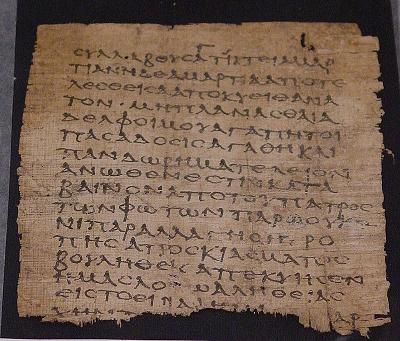| Change to Book/Chapter View |
|
|
|
Translation process is ongoing. For current status see details |
|
|

Papyrus 23 Date: Late Second or Early Third Century A.D. Discovered: Oxyrhynchus, Egypt Location: Urbana, Illinois; University of Illinois Contents: James 1:10-12, 15-18
James 1 10 and the rich, in that he is made humble, because like the flower in the grass, he will pass away. 11 For the sun arises with the scorching wind and withers the grass, and the flower in it falls, and the beauty of its appearance perishes. So the rich man will also fade away in his pursuits. 12 Blessed
is a person[1] who
endures temptation, for when he has been approved, he
will receive the crown of life, which [..] 15 Then the lust, when it has conceived, bears sin. The sin, when it is full grown, produces death. 16 Dont be deceived, my beloved brothers. 17 Every good gift and every perfect gift is from above, coming down from the Father of lights, with whom can be no variation, nor turning shadow. 18 Of his own will he gave birth to us by the word of truth, that we should be a kind of first fruits of his creatures. [1] The World English Bible has translated the Greek word aner as a person. It is more literally a man. The World English Bible is not usually a gender-neutral translation, but this is an exception. |
How to read these pages: The
translation to the left is based on the World English Bible. Words in regular
black font are words in the manuscript matching the Majority Text for that
passage. Words
in italics cannot be seen in the manuscript, since the manuscript is
fragmentary. These words are supplied for readability by the World English
Bible translation. Words
present in the manuscript but with some letters unreadable or missing are in blue
like this: blue. One Greek word often is
translated into multiple English words, and when this occurs, all the English
words are in blue. Words
present in the manuscript but with spelling or trivial word order differences that do not affect the
meaning are in green like this: green. If
the manuscript is different from the Majority Text, words in the Majority
Text that are missing from the text of the manuscript are marked through in red
like this: If the manuscript is different from the Majority Text, words in the manuscript that are not in the Majority Text are underlined in red like this: new words.If the manuscript differs from the Majority Text yet matches another well-known text, this is noted in the footnotes.
|
